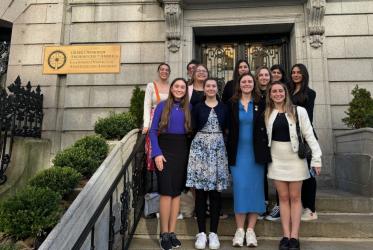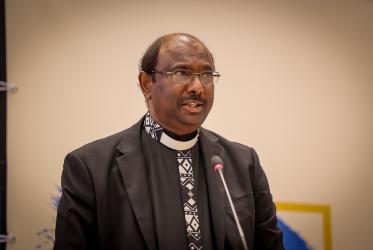“The time has come for healing of memories,” said Fr Michael Lapsley, director of the Institute for Healing of Memories, South Africa, during an event held at the UN headquarters in New York, on 26 April. “This generation will not complete this task, but the next generation will be thankful for the effort.”
The panel “Atrocity Crimes, Transitional Justice and Healing of Memories” was co-organized by the Permanent Mission of the Republic of South Africa to the UN, the UN Office on Genocide Prevention and the Responsibility to Protect, and the World Council of Churches (WCC).
In his remarks as one of the speakers of the panel, Lapsley reflected on the healing process that must follow violent events. "Acknowledgment is the first key step on the journey of healing,” he said.
While introducing the topic of the event, Rudelmar Bueno de Faria, representative of the WCC to the UN, spoke of “an immediate need to look for intentional actions to ensure accountability, promote justice, healing and reconciliation by exploring and acknowledging the emotional and spiritual wounds carried by nations, communities and individuals.”
“Healing of memories seeks to decisively break the destructive cycle of suffering, anger and violence that can disfigure societies,” he added.
In recent years, the world has seen a significant escalation in tensions among groups of different religions, beliefs and ethnicity in many regions, which have often resulted in incidents of politically- and sectarian-motivated violence accompanied by hate speech to fuel hatred that in some cases incites discrimination, hostility or violence.
Many people were victims of atrocity crimes and the response mechanisms to countering violence and promote peace often do not give proper attention to aspects of reconciliation, healing of memories, promotion of truth, justice, reparation and guarantees of non-recurrence.
For Dr Purnaka L. de Silva, founding director of the Institute for Strategic Studies and Democracy, Malta, without addressing atrocity crimes, transitional justice and healing of memories at the macro-level, “humanitarian actors cannot hope to affect a sea change to protect victims and perpetrators and look to ensuring that peace prevails.”
Among other aspects, de Silva stressed that the cycle of violence and bloodshed can be broken also by protecting democracy and combating belief in absurdities. “Extreme nationalism, populism, xenophobia and racism in all forms are a threat to humanity that must be contained at all costs by politicians, legislators, diplomats, academics, social workers, civil society,” he said.
The panel was moderated by Dr Azza Karam, senior advisor on Culture and Social Development, at the UN Population Fund and the coordinator of the Inter-Agency Task Force on Engaging with Faith-Based Organizations for Sustainable Development.
The panel also included Ambassador Jeremiah Nyamane Kingsley Mamabolo, permanent representative of the Republic of South Africa to the UN and Dr David J. Simon, lecturer in the Department of Political Science at Yale University, as well as associate director of Yale’s Genocide Studies Program and the director of that program’s Rwandan Genocide Project.
A video message from UN Special Adviser on the Prevention of Genocide and Responsibility to Protect, Adama Dieng, was shared with the participants.
Related link:





